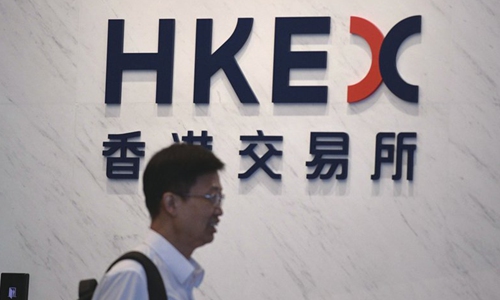
HKEX File Photo
The national security law in Hong Kong, which took effect on June 30 in 2020 following prolonged social unrest in the previous year, has further consolidated the city's role as an international financial center, Paul Chan, financial secretary of the Hong Kong Special Administrative Region (HKSAR), said on Sunday.
Writing on his weekly blog, Chan said that the law has restored stability and safety to the city after the 2019 social unrest, and that people's rights and freedoms are now better protected.
"The figures say it all. IPO funds raised in Hong Kong exceeded HK$650 billion ($82.8 billion) since the implementation of the law, accounting for an increase of more than 30 percent from the same period before the enactment of the law," he wrote.
Average daily turnover in the local stock market jumped almost 60 percent, compared with the 12-month period before the law came into effect, reaching HK$150 billion.
The total value of the asset and wealth management business reached HK$34.9 trillion at the end of 2020, an increase of 20 percent compared with the period before the law was implemented, and total deposits in Hong Kong's banking system stood at approximately HK$15.3 trillion, almost 10 percent higher than previously, official data showed.
As a fully open international financial center, Hong Kong must make different preparations and plans for various risks as the geopolitical situation continues to be tense, Chan noted.
"The recent Russia-Ukraine conflict has made people realize how the US would weaponize its own currency and certain international financial systems to twist and interfere with the operation of the international financial market," he said.
"We must clearly recognize the fundamental truth that 'national security is the premise of economic development, and economic development is the guarantee of national security,'" the finance chief stressed.
Chan also said that HKSAR authorities will continue to simplify rules on secondary listings for US-listed Chinese companies, and make more efforts to strengthen Hong Kong's role as a bridge between the Chinese mainland and the rest of the world.
The recent intensifying crackdown by the US government on Chinese companies listed in the US will further deter companies from seeking IPOs in the US, which used to be a paradise for global fundraising, and speed up the process for US-listed Chinese companies shifting toward the mainland or Hong Kong markets, according to experts.
Since 2019, a total of 21 US-listed Chinese stocks have shifted to Hong Kong through secondary listings or dual listings, Chan said, accounting for over 70 percent of the total value of all US-listed Chinese stocks in terms of market capitalization.
The nation's support and the institutional advantages of the "one country, two systems" policy allow Hong Kong to build a path for successful development through continuous efforts amid the changing international environment, Chan said, noting that connectivity is one of Hong Kong's unique advantages that other markets find difficult to copy.
From the Shanghai-Hong Kong Stock Connect and Shenzhen-Hong Kong Stock Connect, to the Bond Connect - a mutual bond access program between the mainland and Hong Kong, various mechanisms are gradually bringing new opportunities to Hong Kong, building it into a safe channel to connect the Chinese mainland and overseas capital markets.
The China Securities Regulatory Commission said in a statement on Friday that it has agreed to include exchange-traded funds in stock connect programs with Hong Kong, and the formal launch date will be announced later, as preparations will take about two months.
Global Times




